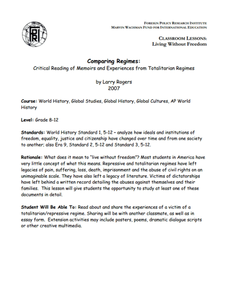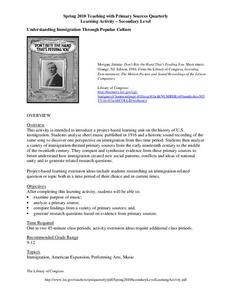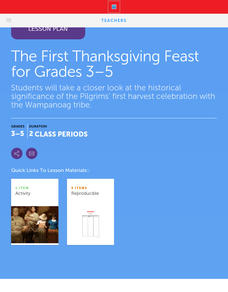Curated OER
Japanese Culture--Comparing the Japanese Educational System to the American
Students study the Japanese educational system and compare and contrast it to the American system. They discuss a typical school day in America and what they believe a typical day is for a Japanese student. Next they write an editorial...
Curated OER
Defining American Culture Photographic Parallels
Pupils assess the diversity of the photographs taken by a Czech photographer, that illustrate how existed in 1920's Texas. Then students compare and contrast these photographs with more current photographs of Texans and evaluate in what...
Curated OER
Oral History: Interviewing Elders
Sixth graders examine oral history traditions. They interview family members about their childhoods and compare them to their own. Students use the collected information to make posters, letters, essays, or poems about their research.
Curated OER
Case Studies: Cross-Cultural Comparison
Students examine maps of Lebanon, Vietnam and Nigeria, discuss relationship between ethnicity, land and conflict, review material from case studies, complete comparison chart, and write essays comparing two of the case studies.
Curated OER
Trash! How Cities Work: Dealing with Garbage in the US and India
Students identify how different cultures deal with the challenge of trash. Read an excerpt from a chapter book based on real life written from the Southern Indian perspective. Describe the life of a street child in Southern India....
Curated OER
Christmas Around the World
Students explore Christmas celebrations in different countries. They create presentations giving information about Christmas celebrations in different countries. They compare and contrast traditional Christmas celebrations around the world.
Curated OER
African Masks And Their Impact On Western Art
Explore the influence of African-style masks on Western art. Learners create individual masks using construction paper. They discuss and explore the techniques used to create these types of masks. The resource includes links to...
Peace Corps
Family
Family traditions are the focus of a lesson that explores the lives of children in India and those in your classroom. Scholars examine their own family roles and traditions, then respond to an informative text detailing a young...
Foreign Policy Research Institute
Comparing Regimes: Critical Reading of Memoirs and Experiences from Totalitarian Regimes
Can you imagine living in a totalitarian country? Learners will read several primary source memoirs to gain a deeper understanding of what life is like under a controlled government. They'll discuss each piece in pairs, research...
John F. Kennedy Center
Baila! Latin Dance in the Spanish Classroom
One, two, three. One, two, three. Invite your language learners to practice the steps for researching and presenting information. Each small group has the task of explaining one Latin dance in full detail.
Scholastic
The First Thanksgiving Feast for Grades 6–8
It's time for the feast! Young historians complete their study of the First Thanksgiving by completing an online activity, watching a slideshow, and examining a First Thanksgiving timeline. After answering text-dependent questions to...
National Endowment for the Humanities
Kennewick Man: Science and Sacred Rights
"Have respect for the dead!" Scholars investigate how science and religion often clash. As they look into the laws of science and the laws of religion, the legal ramifications at the federal level of both play into an argument they...
Library of Congress
Understanding Immigration Through Popular Culture
Class members are introduced to a project-based learning unit on US immigration with an activity that asks them to analyze sheet music and other primary source materials to uncover issues raised by immigration.
Museum of Tolerance
Disenfranchised People of the New Nation
Why are some immigrant groups in the United States embraced while others become disenfranchised? To answer this question, teams investigate why groups emigrated to the US, why some of these these peoples were...
Scholastic
The First Thanksgiving Feast for Grades 3-5
Scholars examine the first Thanksgiving through books and interviews while they complete a KWL chart. Pretending they are part of the feast, learners craft a scrapbook page that features images related to their experience. Pupils reflect...
Curated OER
The Rigors of Learning a New Language
Students read an autobiography of a peace corps volunteer studying Chinese. In this cultural acceptance lesson, students compare the dialects of Chinese with English dialects. Students discuss the differences in learning and teaching a...
Curated OER
Berlioz the Bear
Young children read the story, Berlioz the Bear and complete various reading and writing activities. They learn about fiction and non-fiction, and complete graphing and writing activities for the story. Youngsters draw the bear and use...
Curated OER
Native American History
Fourth graders use a previous and current map of the state of Michigan to compare cities and roads. They look for names that come from the Native American culture. They participate in a class discussion to compare findings.
Curated OER
Children: Then and Now
Through a series of activities, children discover the differences between their lives and the lives of children in the 19th century. They research and compare roles and responsibilities (in general and among genders), forms of education,...
Curated OER
Bacteria in Drinking Water And Water Purification
Students explore how sewer systems can contribute to water pollution and perform an experiment to see how well a water purification technique can protect against water-born microbial illnesses. They compare the bacterial growth from...
Curated OER
City Architecture at Night
Students research the social, economic, and architectural characteristics that distinguish different cultures and civilizations in two different cities of the world. They prepare a comparative pictorial and written report on the two...
Curated OER
Family's Tree House
Young scholars research their family history and graph it in a family tree format. They appreciate similarities and differences in various cultures and customs by comparing and contrasting their family trees. They then create an original...
Curated OER
European Agriculture
Students make inferences on how physical geography affected the development of early civilizations and come up with solutions to global issues. In this physical geography lesson plan, students compare maps of the past to maps of today to...
Curated OER
Twain: Icon and Iconoclast
Learners examine work by Mark Twain in the context of pre- and post-Civil War America. In this cross curricular lesson, students gather biographical information about Twain, use a Venn diagram to compare and contrast him with...























